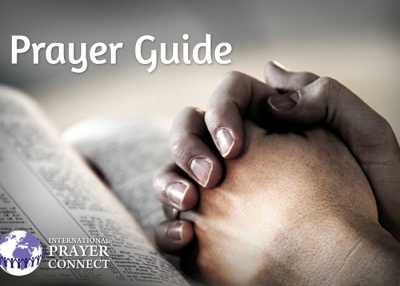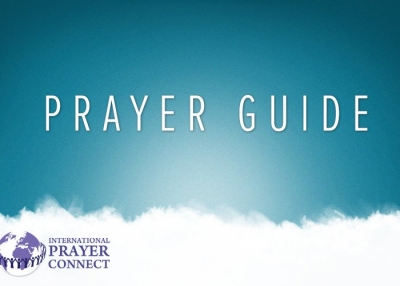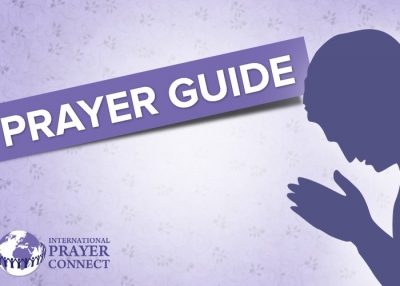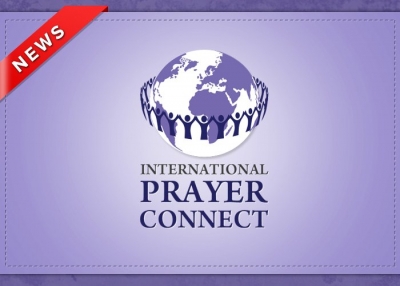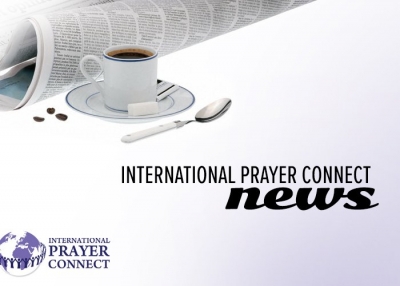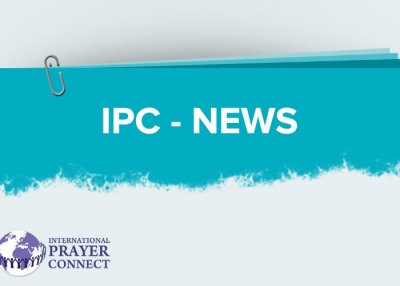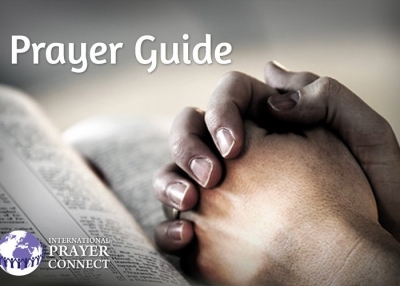Some goals and outcomes to be realized through the WPA:
1. The ultimate goal of the World Prayer Assembly is two-fold- to see the knowledge of the glory of the Lord filling the earth as the waters cover the sea (Habakkuk 2:14) and the fulfillment of Jesus’ prayer that His followers become one so the world will know He is its Creator and Savior (John 17:21).
2. The WPA will be a “new wave” to strategically connect and empower the global prayer and mission movements as 5000-6000 Christian leaders from up to 220 nations connect with the Lord and each other through the power of united prayer.
3. It will assess what the Body of Christ has experienced through the worldwide explosion of prayer efforts since the last International Prayer Assembly (1984) and enable cross-fertilization of a much larger cross-section of prayer ministries from all traditions and segments of the Church.
4. In the spirit of Acts 13, we will seek to hear from the Lord of the Church what He will reveal concerning the role of the global prayer movement in His purposes so that every nation, city and rural area throughout the world becomes filled with ongoing intercession and Spirit-inspired action until His Kingdom’s values are manifested there.
5. The WPA will encourage and launch the next generation to become cutting-edge leaders for Christ’s global prayer and mission movement, as children and youth take their positions as equal partners with adults in helping to lead it.
6. Prayer networks and ministries worldwide will meet with those who are prayerfully working for transformation in all spheres of society such as government, education, business/marketplace, arts and media, etc.
7. Ministry leaders will learn from one another and plan new strategies to impact the realms of world evangelization and the reaching of the unreached, spiritual revival of the Church, as well as social justice and humanitarian efforts for the glory of God.
Criteria for Participating in the World Prayer Assembly
You can also help by sharing the vision of the WPA with others and by pointing them to our website www.worldprayerassembly.com. Here are some criteria for those who should come to the World Prayer Assembly:
• Ministry/ mission leaders – both from church and marketplace realms
• Network leaders
• Leaders who are serving in all walks of life such as the “seven mountains” or spheres of society (Arts/Media, Business/Marketplace, Church, Development of the Poor, Education, Family, Government)
• Youth, student and child leaders
• In other words, anyone with a heart for prayer who is making an impact in his/her community or sphere of influence
Another way you can help is by providing financial support. 100% of what you give to the Transformation Prayer Foundation will go directly to the World Prayer Assembly. You can donate with a bank draft or credit card directly by pushing this button.
Thanks so much for your help!
More than two weeks have passed since the tremendous earthquake, devastating tsunami and radiation leakage. The death toll has topped 10,000, there are over 17,000 missing all feared dead. Dear friends, we must continue to pray, give, and prepare for more involvement. Locally things continue to return to normal with many shortages having ended. Rolling power outages continue in Tokyo (and here today). But up north transportation is in a shambles, supplies limited, and people are without food and water.
PRAY for the restoration of electrical power throughout the region and especially in the hard-hit areas.
PRAY for the continual difficult and dangerous effort of restoring the vital functions at the nuclear power plants. Local and regional radiation leakage is still an issue.
PRAY that especially the young would be protected from any harmful exposure.
(March 25th, 2011 by John) More details on the church and spiritual situation at www.gospelrest.com.
The areas affected by the earthquake and tsunamis of Miyagi, Fukushima, and Ibaraki are some of the most spiritually needy places in Japan. With over 4.9 million people yet only about 9,000 active Christians (about 0.15%). Fukushima has the lowest average worship attendance with only 19 per church. There are one city and 44 towns with no church. There are 86 missionaries assigned to these prefectures.
One town in Ibaraki has over 46,000 people with no church and several others have over 24,000 people with no churches. Average attendance for all the churches in Japan is the lowest in Fukushima prefecture. Ibaraki prefecture has the least number of people claiming to have any religious beliefs. (Sources: CIS News 12/2012, JEMA Directory 2010)
Pray also for the Japanese people to open their hearts to the Lord and that many will come to Christ through this enormous tragedy.
“All the major cities of North Africa have seen massive protests. Some protests are being tolerated and dispersed with lower levels of force, as in Morocco and Algeria. The significance of the events now unfolding in the Arab World is perhaps greater than anyone can fathom or describe. From the day Simon of Cyrene carried the cross for Jesus, to the day of Pentecost, through the martyrdom of countless thousands, North Africans have been in the heart of our heavenly Father. The cries from the hearts of the North African people are the cries of people made in God’s image, longing and thirsting for justice, for freedom, for equality, for dignity. Their cries are echoed across the Arab World – these people want justice in the place of corruption, they want their dignity as human beings in the place of fear, they want truth in the place of lies and censorship, they want their freedom of conscience to express their personal opinions without being beaten or imprisoned or mysteriously “disappearing.” They want to choose their leaders, replacing those who are corrupt or ineffective in providing employment, social services and good leadership; rather than being forced to watch their leaders become rich through corruption and injustice.
LIBYA Fighting and Disunity Run Rampant—The nation including its leader Gaddafi is heavily involved in witchcraft and wears an amulet to make him “invincible”. Gaddafi’s son is a key leader and supports his father. All citizens in Libya were put through a blood covenant requiring them to give blood. Libya has tribal factions that continue to fight and hate.
EGYPT Division in the Midst of Freedom—After Hosni Mubarak stepped down, Coptic and Evangelical Christians conducted mass and worshiped opening for the first time in a long time in the square. However, the Christian community is divided with some wanting revolution and other afraid of it. Some Islamic groups excited about the future. The Muslim Brotherhood’s political party presents themselves as leaders of the revolution. The Doors are open for true reform.
BAHRAIN Peaceful Transition?—Bahrain’s ruling family has listened to protesters and started a dialogue between the two groups. They are also respecting their right to protest. The Internet provides information on the Gospel and Christ, and the Bible can be downloaded in Arabaic. Forums and chat rooms are used to explain the gospel. Bahrain Christians face discouragement, illness, and difficult times. It is not easy to trust in Him daily and draw on His strength.
TUNISIA Peace in Persecution and Death Threats—The Muslim Brotherhood, back after being banished for more than 23 years, wants the Jasmine revolution to be a religious one. Protests for separation of state and religion occur in the capital. Some Christians are scared; others braver. Pray for Tunisian Christians as they face persecution and increased death threats. Ask God to strengthen them. Pray that the persecutors’ hearts will turn.
YEMEN A Country Seeking to Restore its Reputation—Most Yemenis, disgusted with the negative international picture that is portrayed by most media channels, love their country and seek a restored reputation. One of the president’s slogans sums up much of the Yemeni worldview, “To preserve and protect!” The country is ruled by a tribal system with groups in both north and south wanting to secede from the country. Violent uprisings and daily demonstrations in most of the main cities have occurred.
ALGERIA From Political Change to Spiritual Hunger—The Algerian people hunger for freedoms many consider basic, and now most protests are political in nature, but such massive change can produce a spiritual hunger for truth and God. The Algerian youth have organized and performed many demonstrations to bring about immediate change to ensure a better future. The government seems to be willing to accommodate; however, it is unclear if this is done to placate the protestors or if it is a sincere desire to make things better for the people.
JORDAN Stability in the Midst of Change—The Hashemite Kingdom of Jordan is a small island of peace and political and economic stability. It is a refuge for Palestinian and Iraqi refugees. It is an economic hub for international business. In recent years, Christians have seen God open doors for many to hear the Truth and respond. Despite 95% Sunni Muslims, the Church is a protected minority and worships freely. King Abdullah champions the Inter-faith dialogue and is the initiator of the Amman Message (2005), one of the main voices of the Reform Movement within Islam today.
SYRIA Balance of Power—Syria’s government is a confused balance of secular ideals and practices and combines limited support for Hezbollah with a strong anti-western stance. Its peoples have limited freedom of expression and fear of secret police. Chrisitans, however, have freedom to operate openly, but government informers infiltrate most churches. Recent crackdowns on evangelical churches have struck fear, but the gospel goes forward. The number of new believers grow.
MOROCCO Hopes and Challenges for the Future—Moroccan Christians are at the point of choosing to either deny their Lord or suffer. With 150 westerners and NGO workers forced to leave in 2010 for alleged proselytism, believers’ peaceful coexistence has been shaken. Protests are contained because of limited freedom of expression. Despite increased economic opportunities and liberalization, poverty is still widespread and unemployment remains high.
IRAQ Open Hearts are Finding Christ—Iraqis have shown patience and forgiveness for the good of the country since the 2003 war. A smaller group, however, works to stir up violence. Iraq’s future rests on the outcome of this struggle. The Christian minority has suffered attacks over the last few years. Many seek to leave the country; others stay with hopes for the future and reach out to compassion. A significant number of Muslim Iraqis are finding Christ.
SAUDI ARABIA Inevitable Change—Women aren’t allowed to drive or travel without a male relative, and some girls are forced to marry before age 13. Many who are wealthy, travel, and TV shows ask, “Why can the rest of the world live in freedom, and we need to live like this?” Cultural strain is intense; change is seen by most as inevitable. Raids on underground churches have stopped almost completely—an answer to years of prayers.
PALESTINE Ending the Cycle of Violence—A vast majority of Palestinians want peace with their neighbors and stability for their children. Extremist groups though are angered by injustice and spurred to violence. NGOs work with the Palestinians to bring basic needs (education, employment, social services, water access). About 98% are Sunni Muslims in the West Bank and Gaza Strip. Christians have emigrated to the West because of war, financial strain, and a better future for their children. The Muslim and Christian communities have peacefully co-existed. Evangelical churches remain strong in faith.
OMAN Hopes and Challenges for the Future—The Oman Muslim community looks to Christians as a guide to family living. The Christian families there find opportunities in their daily lives to be examples of a Christ-loving family. Let us lift up all the Omanis who have heard the Story of the Son, but have not received it. Many have heard, the seeds have been spread, and now the seeds need to take root quickly.
QATAR Spiritual Awakening in Comfort—Qataris live a comfortable, wealthy life and hope to see a spiritual awakening. From a worker in Qatar: “We've lived in our home for 6 years and this is the first time we've seen our cactus bloom. We've also witnessed glimpses of 'flowers' blooming in the lives of our friends here, being slowly but surely transformed by the love and grace of our Lord Jesus! Now, may the desert blossom more with the flowers of His love and truth!” Believers, isolated, lonely, and scared, do not have contact with one another or expatriate believers.
KUWAIT Discontent in the Midst of Wealth—Kuwaiti life seems good coming from oil wealth. However, some are not satisfied and turn to drugs, alcohol, or street racing for excitement and meaning to life. In January, scared by the Arab world events, the government gave $3500 bonus to all Kuwaitis plus free food for the next year. Many doubt that cash will appease people’s demands for inclusion in governing their country. Christianity is seen as supporting “Hollywood” values of immorality and greed. But a growing number of Kuwaitis are becoming Christians through the witness and example of the foreign workers.
UAE (United Arab Emirates) New Development from Within—Different rates of development mean that some Emiratis are incredibly wealthy while the lives of others remain more modest. Some are concerned at the loss of local traditional values in the great rush to modernization. Others think flamboyant building projects like The Palm or Khalifa Tower could destabilize the country financially. A large number of expatriate university students are Christians and are interacting with the younger generation of Emiratis who will lead the country in the near future. One secret believer here confided to a worker that she fellowships with "people in another town who believe the way we do!" Praise God for believers finding one another in UAE.
LEBANON Spiritual Awakening—Catholic, Orthodox and Evangelical believers in Lebanon are showing signs of spiritual awakening. Muslims here are have a new hunger and openness, but there are few here to reach out to them. The country is politically divided and the division affects people groups and churches. This nation seeks a new government that will fear God, make wise decisions, and act in mercy for the good of the nation.
SUDAN A New Country—Since 2005, when the Comprehensive Peace Agreement was signed and their civil war was ended, Sudan has seen a steady decrease in violence and political tension. On July 9, 2011, a referendum for Southern Sudan’s independence succeeded. President Omar al-Bashir seemed cooperative and peaceful through the process. Protestors against his leadership have not been overly violent or destructive. Christians see prayer as vital for the past and the future. Many Christians in the north move to South Sudan to start a new life; Christian influence thus lessens. Recently, many churches in the North have worked together to distribute 1 million copies of the Gospel of Luke to help ensure that the Word of God will stay even if they do not.
How do we pray for all these lands?
• That the civil unrest spreading throughout North Africa and the Middle East will be an open door for the Gospel to reach many Muslims.
• That the Lord will continue shaking this region, toppling spiritual strongholds and setting the captives free.
• That Christians will seize this opportunity to share the love of God with their Muslim neighbors, friends and coworkers. Pray for them to be bold, strong and courageous
• That the Holy Spirit will build the Church and give Christians wisdom in how to pray and what to do during this time of turmoil.
• That protesters will realize Jesus Christ is the answer to their discontent. Pray for them to put their faith in Him as Savior and Lord.
• That the leaders in all of the nations where demonstrations are taking place will be saved.
• That a great harvest of souls will result from these events.
• That the Kingdom of God will come to North Africa, the Middle East, and the entire Arab world with power, signs and wonders.
North Korea is considered the worst human rights violating country (by death rate) and the worse persecutor of Christians in the world today. Many millions have been brutally murdered in a genocide that has continued unrestrained for over half a century. Please join the Worldwide Church in repentance and united intercession for the healing, liberation and salvation of all North Koreans.
An estimated over 4,000,000 north Koreans have died of starvation since 1995. Enough food aid has been sent to North Korea to feed the entire population, but the government has diverted it to the ruling party, military, and sold the food aid on the black markets, leaving the average north Korean unaware of food aid from the west.
Up to 1,000,000, including women and children, are believed to have died in brutal concentration camps since 1972. Three generations of entire families can be imprisoned because a relative is suspected of being unfaithful to the regime. Violations of human rights in North Korea include: Gas chambers, chemical and medical experimentation on political prisoners, forced abortions and infanticide, systematic torture, starvation, rape, slavery (brutal forced labor), arbitrary imprisonment, public executions.
Please join believers worldwide in mourning and repentance for the genocide of north Koreans, cruelty and all atrocities which have been committed against the north Korean people.
Please pray for the repentance of Kim Jong Il (dictator), Kim Jong Un (believed to be Kim Jong Il's successor), and all members of the north Korean regime; for the repentance of all officials, guards and military who have committed atrocities and been cruel, for God to raise up godly leaders and godly government over northern Korea at this time, and for the healing, liberation and salvation of all north Koreans right now. Pray for a mighty, unprecedented revival in North Korea and the healing of this land!
"And will not God bring about justice for His chosen ones, who cry out to Him day and night? Will He keep putting them off? I tell you, He will see that they get justice, and quickly." Luke 18:7-8
The Ninth Party Congress is to be held in three or four month’s time. The Party Congress is a five yearly meeting in which the all-powerful Politburo and Central Committee are chosen and the five-yearly national plan approved. In reality these decisions are made behind the scenes in advance of the Party Congress. There could be a struggle for power between groups representing the interests of northern and southern Laos, and those favoring greater allegiance with either Vietnam or China. Competition between these regional interest groups is likely to become more intense in the coming months as whichever group gains control of the Politburo and Communist Party Central Committee will benefit most from corruption and patronage networks.
• Pray for wisdom for the new Prime Minister, Thongsing Thammavong, and all those who serve in the Communist Party and Lao Government.
• Ask God to overrule in the decisions as to who is in the new Politburo and Communist Party Central Committee, and in any decisions that are made in the upcoming Ninth Party Congress.
• Pray for action to be taken at the highest levels to curb corruption.
• Pray for government and party officials who have had previous contact with Christians and heard the Gospel to seek the Lord themselves and be favorable towards Lao believers.
• Pray for a group of Jesus’ disciples, in every village of Laos, worshipping in their heart language.
Pakistan Minorities Minister Shahbaz Bhatti, the cabinet’s only Christian minister, was gunned down by four assailants in broad daylight in the capital Islamabad. Shabaz had received death threats for urging reform of the blasphemy law. This law carries a death sentence for anyone who insults Islam. The Governor of Punjab, Salman Taser, was also killed by his own police guard who felt he was being blasphemous in opposing this unjust law.
The situation looks more grim as the extremist forces working in Pakistan are making it harder to oppose this law or propose any reform of this discriminatory law. This law is a sword of death hanging over every Christian as any one out of animosity can accuse you of blasphemy. Before you can be taken to court to prove your innocence, they will kill you with help of extremist mobs. During trial or in prison, you can also be killed by the police assigned for your protection.
We as a prayer ministry need your prayer support as we have been mobilizing focused, strategic prayers on a nationwide scale to see this law changed. If the prayer tracts sent to churches to pray for this issue fall into the wrong hands, we can face trouble also.
On 25th February an explosive device was thrown at the home of a doctor who works at the Al Ahli Arab Hospital, run by the Anglican Church. The bomb was thrown towards the parking area of his home and damaged a relative's car. Nobody was injured but the family has been badly shaken by the incident and subsequent threats made against him and his family.
The Christian community in the Gaza Strip is deeply impacted by this attack. In addition to the pressures that they share will all the inhabitants of the Gaza Strip, they feel very vulnerable as a small Christian community in an area controlled by Hamas and other strongly Islamic groups. There is growing pressure against them, for example to stop any activity in which boys and girls participate together. There are an estimated 3,000 Christians amongst the 1.6 million population of the Gaza Strip (i.e. 0.2%). Many Christians have moved to the West Bank or further afield, and many of those that remain wish to leave.
The Director of the Palestinian Bible Society issued a call to prayer today (i.e. 4th March) in which he stated: "As I look into Gaza, my heart is broken over this place. I feel that there are serious attempts by the enemy to darken this place by taking out the light and salt of it. I invite you today to stand with the persecuted body of Christ in Gaza by praying for them and keeping them lifted in front of the throne."
Palestinian Christians request our prayers that:
a. The doctor and his family will know the peace, presence and protection of Jesus at this time. Likewise for all Christians in the Gaza Strip
b. Church leaders in the Gaza Strip will be sustained in their ministry by Father, Son and Holy Spirit
c. Officials will act to provide effective protection; and will love mercy, act justly, learn about Jesus and choose to follow Him
A dozen died and about 140 were injured in an outbreak of violence between Christians and Muslims in the Mokottam area of Cairo on March 8. A ministry leader in the city reports:
“Egypt is going through very tough times, with a crumbling system of law and order and an army which—though the only authority “in charge” at present—seems to be quite weak and at time indecisive. Although the Revolution brought some good and necessary changes, it also caused quite a collapse in the fabric of society, including the economic system. Millions of people are out of work, partly because foreign companies, investors and tourists have not returned. Naturally, this all has a negative impact on people who are trying—in vain—to feed their families and is causing great social unrest.”
Mission Network News reports:
“The transitional period is key to the freedoms minorities will experience. The Muslim Brotherhood is taking a pro-democracy stance. What that means in practice could be very different from "freedom." Moeller explains, "Unfortunately, as is often the case in revolutions, the ones that emerge as the most organized and the strongest on these things are the ideological committed In this case, these are the extremists groups that are calling for a more radicalized Sharia law based Egypt in the future."
"Our prayer is that it doesn't take a violent turn, as these indicators [predict]. However, we recognize that the church will be under pressure in the next few months--and maybe more pressure than ever before," Moeller says.
Right now, it's hard to anticipate what the future holds for believers. Pray for those facing economic and social challenges because of their Christian faith. Pray that the new government will uphold the constitutional freedom of religion. Pray that the ministry of churches in Egypt will continue and that the Gospel will be preached throughout this nation.”
